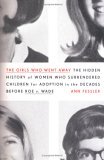Media Reviews
"Although at times rambling and self-pitying, these knowing oral histories are an emotional boon for birth mothers and adoptees struggling to make sense of troubled pasts." - PW.
"Thought-provoking and thoroughly researched." - Library Journal.
"A valuable contribution to the literature on adoption." - Kirkus.
This information about The Girls Who Went Away was first featured
in "The BookBrowse Review" - BookBrowse's membership magazine, and in our weekly "Publishing This Week" newsletter. Publication information is for the USA, and (unless stated otherwise) represents the first print edition. The reviews are necessarily limited to those that were available to us ahead of publication. If you are the publisher or author and feel that they do not properly reflect the range of media opinion now available, send us a message with the mainstream reviews that you would like to see added.
Any "Author Information" displayed below reflects the author's biography at the time this particular book was published.
Reader Reviews
Write your own review
Cathryn Conroy
A Powerful, Unflinching Historical Account of Being Unmarried and Pregnant in the '50s and '60s This should be required reading for every woman young and old, but especially for women who became teenagers in the 1950s, 1960s, and very early 1970s. This is a heartbreaking, deeply intimate historical account of what happened when girls and young women got pregnant before they were married in a society that had zero tolerance for such behavior.
The 1950s were a magical time—on the surface, that is. GIs had come home from World War II, got married, bought homes, found jobs. Their wives stayed home, had babies, and cared for their new families. It was a time of deep conformity. You followed the rules, you did as everyone else did, and you fit in. You were accepted. But if you broke the rules—such as having a 16-year-old daughter who was pregnant—your entire family was shunned.
Because sex education was pretty much nonexistent in the schools or in the home, birth control not available unless you were married (and even then it was sometimes difficult to get), and abortion illegal, girls who found themselves pregnant had one of two options: Get married or give up the baby for adoption. About half did get married. The other half—too young for marriage or whose boyfriends refused to accept responsibility—were typically sent away to have the baby. A convenient cover story was cooked up, and off the girl went to an aunt's or more likely, a maternity home. There she awaited the birth of her baby, and within days (and sometimes hours) the child was taken from her and sent out for adoption. And then the girl was told in no uncertain terms to just go on with her life and forget the birth ever happened. That scenario led to irreparable psychological harm.
This bold book by Ann Fessler is an unflinching account of what happened to these girls who were sent away. The author recounts the sociological history (in VERY readable language) of good girls vs. bad girls, the intense shame they felt, the family's fears, the fear and loneliness of being sent away, and the inevitable search for these lost children. This is alternated with the heartbreaking personal stories of dozens of these women who recall the chilling, disturbing, and deeply sorrowful details of not only being pregnant and hidden away, but also what it felt like to give up a child. Ann Fessler is herself adopted, and begins and ends the book with her own story.
I venture to say that virtually all of us of a certain age know someone who either "had to get married" or was "sent away." This is that friend's story. The story she never shared. And it's the story you need to hear.
This is a powerful, no-holds-barred, and gut-wrenching account of an important slice of women's history. Five stars is not enough to do this book justice.
